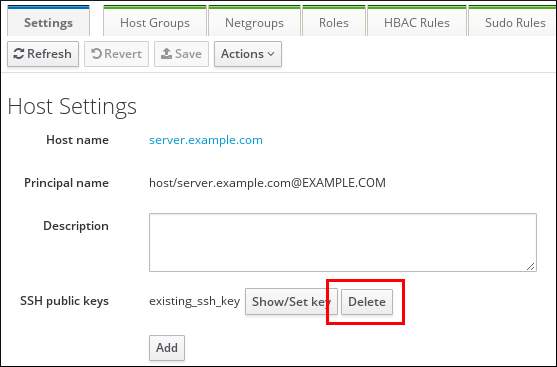Freeipa Generate New Host Key
17.12.2020 admin
- Freeipa Generate New Host Keyboard
- Freeipa Generate New Host Key Mac
- Freeipa Generate New Host Key Mac
- 3How to test
- 4Expected Results
Verify FreeIPA's SSH public key management using realmd to join the current machine to a FreeIPA domain.
- If you have not already done so, run through the test case to join the domain.
Note: All examples below are executed either on server or client. The right place should be indicated by prompt:
The following example demonstrates creating a service principal and keytab on a client host for the HTTP service. In this example, the client host is ipaclient.example.com and the FreeIPA server is ipaserver.example.com: # kinit admin # ipa host-add ipaclient.example.com # ipa service-add HTTP/ipaclient.example.com@EXAMPLE.COM # ipa-getkeytab -s ipaserver.example.com -p. Apr 12, 2018 This will happen the first time you connect to a new host. Type “yes” and press ENTER to continue. Next, the utility will scan your local account for the idrsa.pub key that we created earlier. When it finds the key, it will prompt you for the password of the remote user’s account. OTP authentication in FreeIPA. As of release 4.0.0. Algorithm uses a secret key that is known to the validation server and the token device or software. The key is used to generate an HMAC of a monotonically increasing counter that is incremented each time a new token is generated. The output of the HMAC function is then truncated to a. The FreeIPA server can identify the type of key, such as an RSA or DSA key, from the uploaded key blob. However, in a key file such as /.ssh/knownhosts, a key entry is identified by the hostname and IP address of the server, its type, then lastly the key itself. That looks more like a regular SSL/TLS guide. I was asking about interacting with FreeIPA (likely via certmonger, I think) specifically. If anyone has details on obtaining the default system cert (and especially the private key) and exporting/converting to PEMs, I'd greatly appreciate.

Verify installation
First authenticate as admin:
Verify that the host entry of server.ipa.example.org has the correct SSH public keys set:
The same procedure can be used to verify host public keys of client.ipa.example.org.
Verify that DNS SSHFP records were updated correctly for client:
Public key management
Generate a SSH keypair and create new FreeIPA user with the public key set:
Verify that the user entry has the correct SSH public key set:
Generate another SSH keypair on client.ipa.example.org:
Add the public key to sshuser:
You can experiment further with ipa user-add, ipa user-mod, ipa host-add, ipa host-mod commands, all of them allow setting SSH public keys (in OpenSSH authorized_keys format, see man sshd) using the --sshpubkey option. Note that --sshpubkey overwrites the public keys of user or host with the new value(s), if you want to add or delete public keys, you have to use --addattr ipasshpubkey=.. or --delattr ipasshpubkey=.. instead.
Now that public keys for both hosts and user are set, you can try using ssh to log in remotely from server.ipa.example.org to client.ipa.example.org and vice-versa:
Both these commands should work without any warnings or errors and should NOT prompt for verification of host identity or password.

Troubleshooting
Known Issue [openssh], [freeipa],[freeipa]: Ssh to other host still asks password. Please add to file /etc/ssh/sshd_config
How do I create a host key file to use with my applications as I can not use system defined /etc/ssh/ssh_host_rsa_key for non-root account under Linux / Unix / Apple OS X / *BSD operating systems?
You need to use a command called ssh-keygen. This command generates, manages and converts authentication keys for ssh. It can create RSA keys for use by SSH protocol version 1 and RSA or DSA keys for use by SSH protocol version 2. he type of key to be generated is specified with the -t option. If invoked without any arguments, ssh-keygen will generate an RSA key for use in SSH protocol 2 connections. The -f option specifies the filename of the key file.
Advertisements
Why create a new host key files?
You may need a new key file:
- Your system is compromised.
- Your keys are stolen.
- You forgotten the passphrase.
- Your application need a new host key.
- You can not read the default system key files stored in /etc/ssh/ directory but your non-root application needs key.
- You got an error message which read as “Could not load host key: /etc/ssh/ssh_host_key*”.
ssh-keygen Syntax
The syntax is:
Freeipa Generate New Host Keyboard
Example
Create a host key file in your $HOME/.ssh/myapp as follows. First, create a directory to store your host key file, enter:$ mkdir -p $HOME/.ssh/myapp
To create a host RSAv2 key file, run:$ ssh-keygen -t rsa -f $HOME/.ssh/myapp/rsa_key_file
Sample outputs:
Freeipa Generate New Host Key Mac
Windows games license key generator. Type the following commands to verify the keys:$ ls -l $HOME/.ssh/myapp/
Sample outputs:
You can now use keys with your app:$ mycool-app -key $HOME/.ssh/myapp/rsa_key_file -d
Freeipa Generate New Host Key Mac
ADVERTISEMENTS